#importance of hajj
Explore tagged Tumblr posts
Text
هل يجب الحج على المديون #hajj #hajj2024 #macca #madinah #kabah #muslim #umrah حج_2024, #مكة #المدين
#هل #يجب #الحج #على #المديون #hajj #hajj2024 #macca #madinah #kabah #muslim #umrah #حج_2024 #مكة #المدين #حج, #حج2024, #مكة, #المدينة, #كعبة, #مسلم, #عمرة, #إسلام, #رحلةحج, #مبارك, #غفرانالذنوب, #اركانالحج, #نسكالحج, #طواف, #سعي, #وقوفعرفة, #مزدلفة, #منى, #رميالجمرة, #تحلقالحاج, #تقصير, #تلبية, #لبيكاللهملبيك, #الحجمبشربالجنة, #الحجاركانوواجبات, #الحجمستحبات, #الحجاتباعالهدي, #الحجاروعرحلة,…

View On WordPress
#alhamdulillah#duas for hajj#explore hajj#get ready for hajj#hajj day#hajj dua#hajj essentials#hajj for beginners#hajj greetings#hajj mabroor#hajj moments#hajj mubarak#hajj steps#hajj vibes#hajj wardrobe#hajjaccepted#how to perform hajj#ibaadah hajj#importance of hajj#madinah#Makkah#performing hajj#places to visit in hajj#prepare for hajj#rituals#sunnah of hajj#types of hajj#what is hajj#رحلة_عمرة#عرفة_عرفات
0 notes
Text
Love For All: Forever Palestine 🇵🇸!

A Symbol of Palestine, Made By Izzat Hirbawi (Mosab Shawer/Al Jazeera)
— By Mosab Shawer | Published: 6 January 2024 | Al-Jazeera English
Forever Palestine, Hebron, Occupied West Bank �� Izzat Yasser Hirbawi, a balding 55-year-old man, stands smiling at the entrance to the Hirbawi Factory in Hebron, the only place in Palestine, its website proudly proclaims, that produces Palestinian Keffiyehs.
Three Hirbawi Brothers, Izzat, Abdullah and Jouda, who now own and operate the factory, started working there as children, accompanying their father, Hajj Yasser, who had founded it in 1961.
A Merchant turned Entrepreneur, Hajj Yasser began his career importing Keffiyehs from Syria before deciding to start his own Factory with Two Looms imported from Japan.
Hajj Yasser was deeply passionate about the Keffiyeh, something he transferred to his boys at an early age, instilling a deep respect for its symbolic value among Palestinians everywhere, as well as the importance of it being made in Palestine by Palestinian hands.
“We’re Happy … We Love Our Work, No Matter How Long or Hard We Work,” Hirbawi Tells Al Jazeera.

'Visitors can’t stand this noise, but I’ve gotten used to it, just like I’ve gotten used to every detail of every machine in here,' says Abdulaziz al-Karaki (Mosab Shawer/Al Jazeera)
The Hirbawi boys were not the only kids working the looms; Abdulaziz al-Karaki was there, too, from age 15, accompanying Hajj Yasser.
He is now a regular fixture on the factory floor at 70 years of age. He still gets the looms going every morning and makes sure that everything is prepared for the day.
“The Keffiyeh Isn’t Just Something To Earn Money From. It Preserves Palestinian Heritage.”
As the 20 looms the factory now boasts start up, a huge racket rises in the cavernous space and al-Karaki smiles at the familiar din. Moving away from the rattling machines, he says: “Visitors can’t stand this noise, but I’ve gotten used to it, just like I’ve gotten used to every detail of every machine in here.”
He does not want to retire, ever, he tells Al Jazeera as he leans over a roll of fabric coming off a loom, cutting extra threads off to make sure the pattern comes through cleanly.
“I just want to keep working at this job, I love it so much, making quality Keffiyehs that will mean as much for the people buying them as they do to me,” he says emotionally.

Izzat Hirbawi inspects one of the shuttles used in manufacturing keffiyehs (Mosab Shawer/Al Jazeera)
Worn as a scarf or head covering, the Keffiyeh adorns people from all walks of life, from the young to the old, from people with a more traditional fashion sense to the hip and trendy.
But the Keffiyeh is more than a garment. It carries a deep symbolism, so entrenched with Palestinian identity that some people refer to it as an alternate flag.
This Keffiyeh, Hirbawi says, is distinguished by its quality, as the family insists on using high-quality yarns that are dyed well and weaving them together at a higher thread count.
In fact, despite local and international markets being flooded by cheaper keffiyehs made in other places with lower-quality material and a flimsier weave, Hirbawi insists that their quality will prove itself in the end.
“We will compete with importers, our competition is quality. The quality of our Palestinian industry and the power of that label: Made in Palestine."

The patterns of the Keffiyeh speak to the nature of Palestine as much as its history (Mosab Shawer/Al Jazeera)
Many Palestinian men wear their Keffiyehs day in and day out, with most of the older generation unable to imagine being seen out without one on their heads.
Younger men consider it a revolutionary symbol and wear it when confronting Isra-helli Terrorist Fascist Forces, attending demonstrations or simply participating in traditional Palestinian events.
Hirbawi’s traditional Keffiyeh design captures the essence of Palestinian life. Olive leaves represent perseverance, strength and resilience, as well as culture and peace. A fishnet pattern represents fishing and closeness to the sea, the broad lines embody commercial routes, and the thin lines are Palestine’s long history.
A typical Palestinian Keffiyeh comes in white and black, but now many different colourways are available. “We Now Produce More Than 300 Models of Keffiyeh Colours … [to] Suit Young People,” Hirbawi says.
A popular Hirbawi variation is white, red and black - a nod to Jordan, the country that hosts the largest number of Palestinian refugees and that shares, Hirbawi says, a deep “interconnectedness” with Palestine.
After the outbreak of Israel’s current war on Gaza, global demand for Keffiyehs increased dramatically as people marched and demonstrated in solidarity with Palestinians. But the Hirbawis cannot increase exports as Israel has cut off the cities of the occupied West Bank from each other and there are no Palestinian airports or ports.

Two men walk through Hebron's Old City (Mosab Shawer/Al Jazeera)
Fathi al-Jebrini, 87, has worn the Keffiyeh every day since he was young and reckons that he has not been without his keffiyeh for a single day since he turned 50.
The Old City of Hebron shopkeeper leads the way gently down an arcade of shop doors, pausing to open his little stall with an old-fashioned key.
He sells food items from here, nestled among similar holes in the wall whose owners have all formed a community over the years.
Everyone knows him and he greets a dizzying number of people by name and with a smile. Many of the men are, of course, wearing their Keffiyehs.
He tells Al Jazeera that this tradition is inherited through the generations, with men learning how to wear their keffiyehs from their fathers and grandfathers.
“Wearing it has become an important thing for us to express our identity, especially since the Old City is considered a destination for tourists and is also invaded by settlers who think it’s their country” he says.
In addition, he argues, it is a generally attractive addition to any person and any outfit as well as something that helps keep the elderly warm in the winter as they use it to cover their heads.

Al-Tamimi's shop is full of Palestinian Souvenirs and Knick-knacks (Mosab Shawer/Al Jazeera)
A little further on in the Old City’s market arcade, Badr al-Daour al-Tamimi, 58, is hanging displays of Keffiyehs outside his shop and arranging the other Palestinian souvenirs that he sells to tourists and sometimes exports overseas.
Items made with Fragrant Olive Wood share display space with maps of Palestine and items embroidered in the vibrant traditional colours of Palestinian Tatreez.
The shopkeeper agrees that the Keffiyeh has become a global symbol for people who stand with the Palestinians and a source of Palestinian pride in Palestine and around the world.
This is to the point that, he says, Isra-helli Terrorist Fascist Soldiers often cannot bear to see Palestinian youth wearing it. He, himself, has seen Isra-helli Terrorist Fascist Forces attacking young men in the Old City and forcing them to take their Keffiyehs off.
The Keffiyeh will persevere as a symbol though, the four men agree. As will Palestinian culture and pride in their identity.
For Hirbawi, the mission is as personal as it is national. “This is our heritage, we’re trying to pass it on to the next generations of our family. It is very important to continue and for our family to be in this factory.
“The Keffiyeh Isn’t Just Something To Earn Money From. It Preserves Palestinian Heritage.”

Fathi al-Jebrini, 87, opens his shop (Mosab Shawer/Al Jazeera)
#Forever Palestine 🇵🇸#Palestinian Symbol#Keffiyehs#Izzat Yasser Hirbawi#Hirbawi Brothers | Hebron | Occupied West Bank | Forever Palestine 🇵🇸#Three Hirbawi Brothers | Izzat | Abdullah | Jouda#Merchant | Entrepreneur | Hajj Yasser#Syria 🇸🇾#Factory | Two Looms | Imported | Japan 🇯🇵
3 notes
·
View notes
Text
Important Update for Umrah Pilgrims Traveling for Hajj: Earlier Visa Expiry and New Validity Dates
Important Update for Umrah Pilgrims Traveling for Hajj: Earlier Visa Expiry and New Validity Dates Exciting news for international pilgrims planning to perform Umrah and attend the upcoming Hajj pilgrimage in Saudi Arabia! The Ministry of Hajj and Umrah has implemented crucial updates regarding Umrah visa validity to ensure a smoother pilgrimage experience. Here’s what you need to…

View On WordPress
#Earlier Visa Expiry and New Validity Dates#Important Update for Umrah Pilgrims Traveling for Hajj Earlier Visa Expiry and New Validity Dates#Important Update for Umrah Pilgrims Traveling for Hajj: Earlier Visa Expiry and New Validity Dates
0 notes
Text
The Rising Cost of Living in Gaza: A Struggle for Basic Necessities Amid War and Blockade
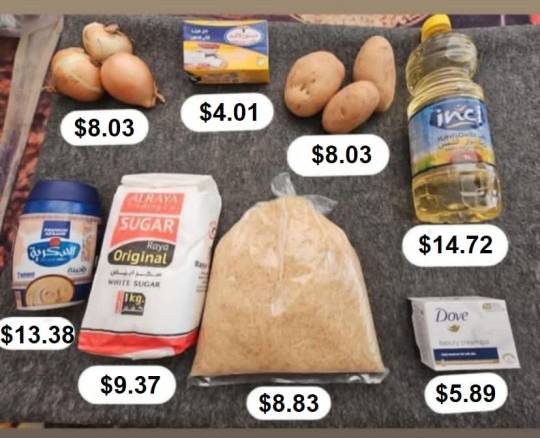
The escalating cost of living continues to place an unbearable burden on individuals and families in areas ravaged by conflict and embargoes. The image provided paints a stark picture of the harsh reality faced by communities—where even the most basic necessities come at exorbitant prices. Essential items such as cooking oil, sugar, and basic hygiene products are not only overpriced but often scarce due to the ongoing war and economic blockade.
For example, a modest bottle of sunflower oil is priced at an astounding $14.72, while a small packet of sugar costs $9.37. Potatoes and onions, once staple and affordable foods, now cost $8.03 each. Even basic hygiene products like soap and tahini are priced at $5.89 and $13.38, respectively. These prices, which continue to climb, highlight a dire economic situation that makes survival a daily struggle for countless individuals.
The root causes of this crisis lie in the devastating impact of war and prolonged blockades that have crippled local economies, destroyed infrastructure, and limited access to international markets. Local production is stifled, and imports are restricted, leading to inflation and a scarcity of goods. The situation is further exacerbated by unemployment and widespread poverty, leaving many unable to afford even the bare minimum required for sustenance.
In addition to food and hygiene, other sectors such as healthcare and clothing are also affected. Many families cannot afford proper medical treatment or seasonal clothing, leaving them vulnerable to illness and harsh weather conditions. The lack of access to affordable and quality resources perpetuates a cycle of poverty, malnutrition, and disease, particularly among children and the elderly.
The international community must recognize the severity of this humanitarian crisis and take action to alleviate the suffering. Lifting restrictions, providing financial aid, and ensuring the flow of essential goods are critical steps toward restoring dignity and hope to those affected. Until then, millions will continue to live under the shadow of deprivation, with the rising cost of living as an ever-present reminder of their plight.
I urge you to take a stand in solidarity with the people of Gaza. My family, like countless others, is struggling to survive these harsh conditions. You can help by donating to our campaign or simply sharing it with others to raise awareness. Together, we can bring hope and support to those in need.
✅ My Campaign ✅ 🔍Vetted by @90-ghost here 🔍✅️Vetted by @gazavetters, my number verified on the list is ( #300 )✅️ here
@ot3 @mangocheesecakes @good-old-gossip @dragon-master-kai @vakarians-babe @prinnay @neptunerings @paper-mario-wiki @newsfrom-theworld @a-scary-lack-of-common-sense @magnus-rhymes-with-swagness-blog @buttercuparry @westaysilly @sunflowersmoths@nieyaoevents @finalgirlabigailhobbs @normal-thoughts-official @flower-tea-fairies @mephal @mothfishing @theaethernetconnection @90-ghost @gaza-evacuation-funds @northgazaupdates2@treeen@keikuri@archivist-goldfish @loook-back-at-it @lookineedsleep@a-scary-lack-of-common-sense@ot3 @reminded @neechees @ankle-beez @paper-mario-wiki @khanger@treesbian @pigswithwings @mobiused @poss-um @possiblythebesteyesintheworld @noble-kale @a-shade-of-blue @chokulit @neptunerings @heydreamchild @dlxxv-vetted-donations @segamascott
Paypal Link
259 notes
·
View notes
Text




Brother Malcolm X (born Malcolm Little, later El-Hajj Malik El-Shabazz, May 19, 1925 – February 21, 1965) was a prominent African-American, Pan African, Muslim minister, human rights activist, and revolutionary leader. He became one of the most influential and controversial figures of the Civil Rights Movement in the United States, advocating for Black empowerment, self-determination, and resistance against systemic racism. Known for his eloquence and fiery rhetoric, Malcolm X challenged the status quo and inspired millions with his call for justice and equality.
Born in Omaha, Nebraska, Malcolm’s early life was shaped by racial violence, poverty, and the tragic loss of his father, a follower of Marcus Garvey. After a troubled youth and time in prison, he joined the Nation of Islam (NOI), where he rose to prominence as a minister and spokesperson. During this period, Malcolm advocated for Black nationalism, separatism, and self-defense against racial oppression. His speeches, writings, and leadership gained him international attention, as he condemned white supremacy and urged African Americans to reclaim their cultural heritage and pride.
Malcolm X's Pan-Africanist beliefs became a central focus after his break from the Nation of Islam in 1964. His pilgrimage to Mecca (Hajj) transformed his perspective, leading him to embrace Sunni Islam and the notion of global solidarity among oppressed peoples. He founded the Organization of Afro-American Unity (OAAU), modelled after the Pan-Africanist ideals of leaders like Kwame Nkrumah and Julius Nyerere and Malcolm called for unity among African nations and the African diaspora to combat colonialism, racism, and exploitation.
Malcolm X’s advocacy extended beyond the United States as he linked the struggles of African Americans to global liberation movements in Africa, Asia, and Latin America. He inspired revolutionary thought and action worldwide, emphasizing the importance of self-reliance, cultural pride, and resistance to oppression.
Tragically, Malcolm X was assassinated on February 21, 1965, in New York City. His legacy as a fearless leader and Pan-Africanist visionary continues to resonate, influencing movements for social justice and liberation globally.
#black people#black#black history#black tumblr#blacktumblr#pan africanism#black conscious#africa#black power#black empowering#malcom x#nation of islam#black leader#black icon#black re#garveyite
111 notes
·
View notes
Text
dhul hijjah - a second chance after ramadan ♡
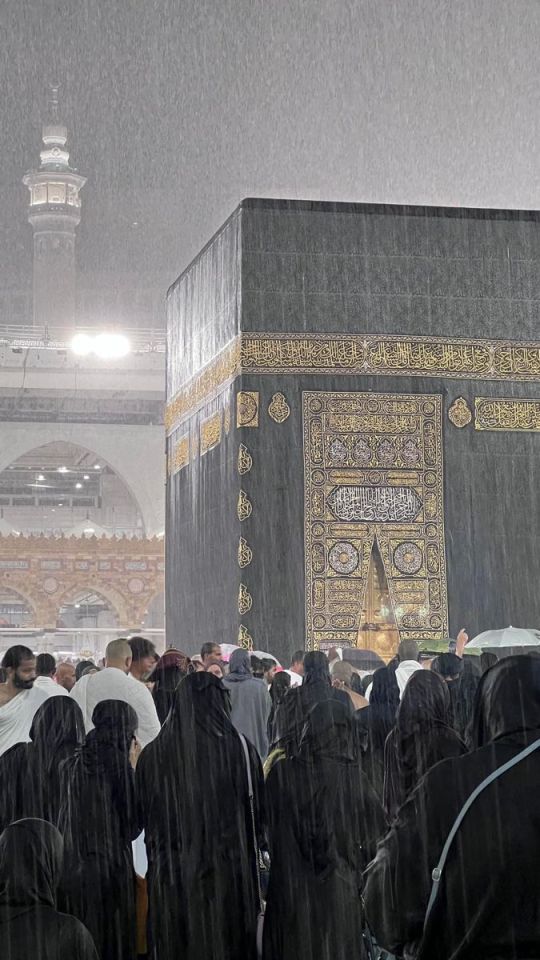
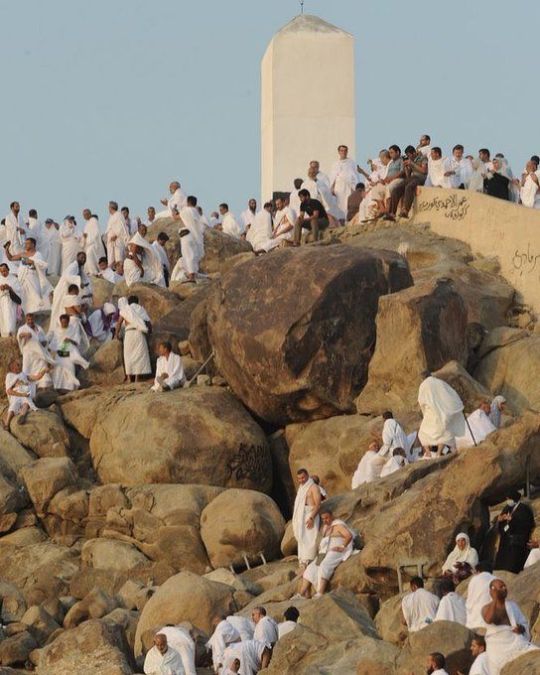
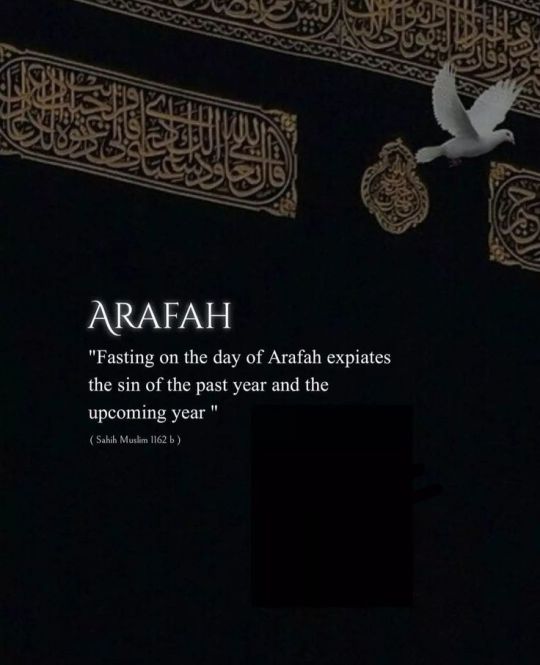
what is dhul hijjah?
meaning 'the month of the pilgrimage' as many muslims go on hajj in this time, dhul hijjah is the twelfth and final month of the islamic year. the first ten days of this month are the best days of the entire year. yes - even better than ramadan:
it was narrated by Ibn Abbas that the Prophet ﷺ said: “There are no days during which righteous deeds are more beloved to Allah than these days,” meaning the (first) ten days of Dhul- Hijjah" - Sunan Ibn Majah 1727
these ten days encompass the day of Arafah, Hajj, and Eid ul-Adha
this month, we remember prophet Ibrahim (as) and how he was told by Allah to sacrifice his son, Hadrat Ismail (as). he took hadrat Ismail (as) on top of mount Arafat for the sacrifice, and just as he was about to sacrifice Ismail (as), Allah told him to stop as He was only testing him to see if he was truly obedient and willing to sacrifice everything for Allah's sake. the 9th day of dhul hijjah is the day of Arafah, commemorating this event.
we also remember how Allah told Ibrahim (as) to leave Ismail (as) and his wife, Hadrat Hajar, in a desert - which, today, is present day makkah.
this month is therefore about obedience, surrender and sacrifice for Allah سُبْحَٰنَهُۥ وَتَعَٰلَىٰ.
depending on the sighting of the moon, dhul hijjah is expected to begin friday 7th june!
what to do in these first ten days?
even if you're not going for hajj, you should use these blessed days for extra righteous deeds and worship, especially on the day of arafah - the 9th day (which falls on 16th june this year, Insha'Allah) - the day before eid.
FASTING
it is a sunnah to fast the first 9 days of dhul hijjah. if you won't fast all 9 days, then it's best to prioritise the 9th day, the day of Arafah. this is because the prophet ﷺ said: “Fasting on the Day of ‘Arafah expiates for the sins of the year before and the year after.” (Sunan Ibn Majah 1730) however, unless you're going for hajj and you're actually at Afarah, then you cannot as it's forbidden to fast while on the mountain.
DHIKR
it's extremely important to increase your dhikr in this time. recite the tasbeeh, tahmeed, takbeer and tahleel often: tasbeeh - subhanallah (Holy is Allah) tahmeed - alhamdulillah (all praise belongs to Allah) takbeer - Allah Akbar (Allah is the Greatest) tahleel - laa ilaha ill-Allah (there is no God except Allah) Allah said “remembrance of Allah indeed is the greatest virtue” (29:46) - it brings you closer to Him, you feel more certain in His powers that He can remove any hardship which makes the heart feel less anxious, Allah becomes your Friend, you'll become successful (remember Allah often so you may prosper” (8:46), it cleans your heart, it protects you from harm, Allah becomes pleased with you. it truly is the greatest virtue.
also recite istighfar (astagfirullah) and repent for your sins
the best dua to recite on the day of Arafah itself is:
laa ilaaha ill-allaahu, waḥdahu laa shareeka lah, lahul-mulku wa lahul-ḥamdu, wa huwa ‛alaa kulli shay’in qadeer - (None has the right to be worshipped except Allah, alone, without partner. To Him belongs sovereignty and all praise and He is over all things omnipotent)
OTHER INCREASED ACTS OF WORSHIP
do extra voluntary acts of worship (nawafil, sunnah prayers, duha prayers)
read a lot of Qur'an
listen to the Qur'an more
send many, many salutations to the Prophet ﷺ (durood sharif!)
practice gratitude. what are you thankful for?
pray tahajjud
give sadaqah / donate to a charity. make sacrifices!
be kind!
read translation and commentary of surahs
listen to islamic podcasts/read islamic books to increase your knowledge
memorise a surah
talk to Allah!!!! pray!!!!
try and increase your acts of worship throughout the 9 days and especially on the 9th day, the day of arafah, which is the day before eid! (16th june Insha'Allah, depending on where you are in the world)
10th day - eid ul adha
on the tenth day of dhul hijjah (eid), our beloved Prophet ﷺ used to give Qurbani (a sacrifice) every year to remember Ibrahim (as) almost sacrificing his son for Allah سُبْحَٰنَهُۥ وَتَعَٰلَىٰ's sake. muslims sacrifice animals all over the world to follow this sunnah, and donating qurbani is encouraged for every Muslim who is financially able to do so (this can be done online)

may Allah سُبْحَٰنَهُۥ وَتَعَٰلَىٰ make it easy for us to utilise these blessed and best 10 days to the best of our abilities, forgive us of our sins, draw us ever nearer to Him and allow us to become His best friends, Allahumma Ameen ♡
#islam#dhul hijjah#arafah#muslim#religion#sabrgirl#ramadan#allah#quran#prayers#islamic#muslims#arafat#jummah
178 notes
·
View notes
Text
Why The Quran Asks Us To Ponder
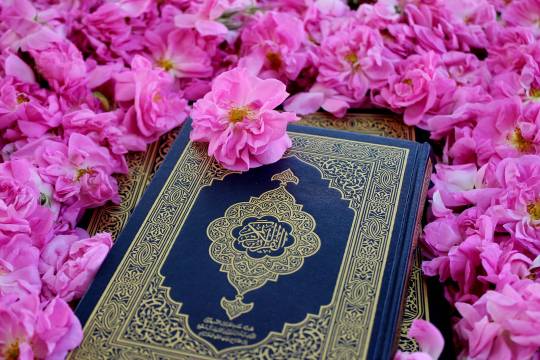
Islam emphasises reflection, urging believers to use reason and contemplation to grasp the magnificence of creation and the purpose of life. The Quran, revealed to be a guidance for humanity, frequently calls us to use our intellect and ponder over the signs of Allah’s creation, encouraging deeper faith, gratitude, and understanding.
Below, we explore the Quran’s repeated call to contemplation, the signs in Allah’s creation, and the wisdom behind this reflection.
The Call to Ponder: A Divine Invitation
The Quran mentions the act of pondering 13 times, inviting readers to think beyond surface realities. Reflection in Islam is not just intellectual but also spiritual, helping people develop a connection with Allah by appreciating the beauty and precision of His creations. The Quran often presents questions that awaken hearts and minds:
“Do you not think?” (Surah Al-Baqarah, 2:44)
“Will you not then ponder?” (Surah Al-Baqarah, 2:219)
“Do they not reflect upon the Quran?” (Surah An-Nisa, 4:82)
“Will they not contemplate within themselves?” (Surah Ar-Rum, 30:8)
“So reflect, O people of insight.” (Surah Al-Hashr, 59:21)
“Do they not contemplate the Word?” (Surah Al-Mu’minun, 23:68)
“Do they not reflect upon the stories?” (Surah Yusuf, 12:111)
“Will you not ponder?” (Surah Al-Anaam, 6:50)
“In that are signs for those who reflect.” (Surah Ar-Rum, 30:21)
“For those who think and reflect…” (Surah Al-Zumar, 39:42)
“Do they not reflect on what Allah has created?” (Surah Al-A’raf, 7:185)
“Have they not traveled through the land to reflect?” (Surah Al-Hajj, 22:46)
“Do they not reflect on the heavens and the earth?” (Surah Ghafir, 40:57)
The Quran draws our attention to the vastness and intricacy of the universe as signs of Allah’s creative power:
“Indeed, in the creation of the heavens and the earth, and the alternation of the night and the day, are signs for those of understanding.” (Surah Aal-Imran, 3:190)
From the sky to the earth, the Quran teaches that every element of nature reflects divine wisdom. The harmony in ecosystems, the precise orbit of celestial bodies, and the perfect design of living beings all bear witness to Allah’s knowledge and control.
Prophet Muhammad (ﷺ) said: “Think about the creation of Allah, but do not think about the essence of Allah, for you will never be able to comprehend it.” (Sunan Abi Dawood, 4726)
Islam invites us to appreciate Allah’s signs but warns against delving into matters beyond human understanding, such as Allah’s essence.
Gratitude and Faith through Reflection
Contemplation naturally leads to gratitude. When we reflect upon the intricacies of creation, we recognizse our dependence on Allah’s blessings and mercy, increasing our faith and humility. The Quran says:
“If you were to count the favours of Allah, you could never enumerate them. Indeed, Allah is Forgiving and Merciful.” (Surah An-Nahl, 16:18)
Reflection transforms routine experiences — such as observing the sunrise or feeling the breeze — into moments of spiritual awareness. Gratitude, in Islam, is not merely verbal but is shown through worship, kindness, and responsible stewardship of the earth.
Islam’s Encouragement to Seek Knowledge
Islam’s emphasis on reflection fosters a deep love for learning and personal growth. The first revealed words of the Quran were:
“Read in the name of your Lord who created.” (Surah Al-Alaq, 96:1)
This call to read, understand, and seek knowledge underscores the importance of intellectual development in Islam. The Prophet Muhammad (ﷺ) said:
“Seeking knowledge is an obligation upon every Muslim.” (Ibn Majah, Hadith 224)
The act of pondering leads to acquiring knowledge, developing moral character, and fulfilling our purpose as vicegerents of Allah on earth.
Islamic Science and Innovation: A Legacy of Enlightenment Exploring the Golden Age and Pioneering Contributions in Astronomy and Medicinemedium.com
The Quran and Sunnah guide believers to reflect on both scripture and creation, allowing them to develop a profound connection with Allah. Through contemplation, one not only understands life’s purpose but also appreciates the beauty, wisdom, and mercy of God. This reflection leads believers to live mindfully, with gratitude and humility, striving to embody the teachings of Islam.
Emphasis of Good Character and Manners in Islam Islam is not just a set of rituals or beliefs; it is a comprehensive way of life that emphasises the importance of good…medium.com
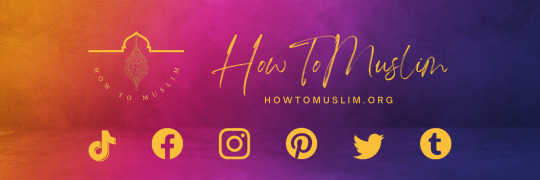
Learn more about Islam here: https://www.howtomuslim.org
46 notes
·
View notes
Note
One of my friends is going on her Hajj over Christmas winter break. And I'm happy and excited for her. Really, I am! She'll get to see and do and experience so many important things, and I'm super happy about that! But I was supposed to go to Israel during the winter. I was supposed to meet family I'd never heard of, walk the land my ancestors walked so many centuries ago, pray at the same places they'd prayed at...all things my friend will get to do now. And I'm trying really hard not to be bitter, but it's just so hard.
.
30 notes
·
View notes
Text

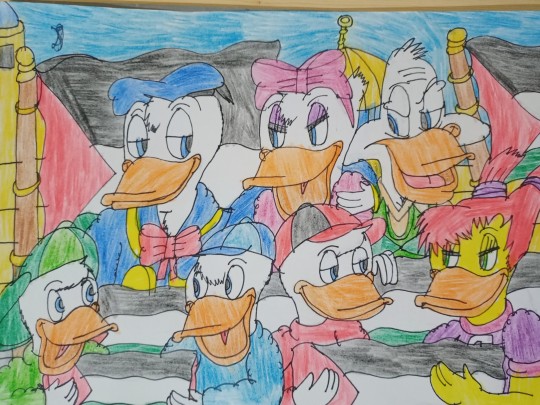
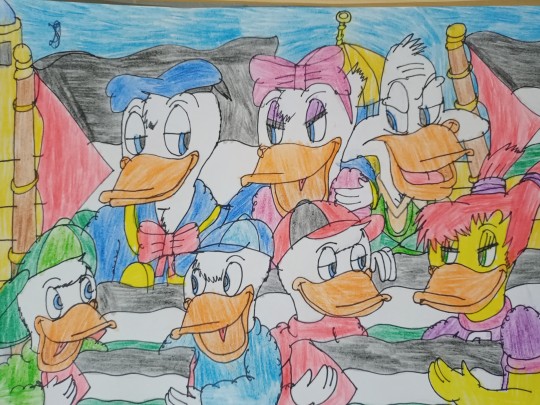
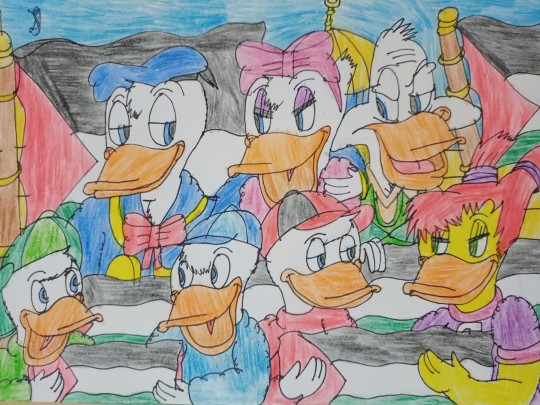
Donald Duck, Daisy Duck and Drake Mallard with their kids support Palestine in Jerusalem - Happy Eid al-Adha - Happy Father's Day! - Duck comics, Ducktales and Darkwing Duck - Duckverse
I wish all Muslims who celebrate a happy Eid! That is, Eid al-Adha. In addition to Eid al-Fitr, one of the biggest Muslim holidays when the Hajj begins and the day of offering to God as well as the remembrance of the deceased. On those days, sacrificial meat is cut, especially meat related to Eid al-Adha. It is celebrated because on that day, Abraham was supposed to sacrifice his son at God's command until the Archangel Gabriel (Jibril among Muslims) intervened, so Abraham (Ibrahim among Muslims) instead slaughtered a ram as a thanksgiving sacrifice to God the creator. An animal (mainly a lamb) is sacrificed and the meat itself is sacrificed and divided into three parts. The family keeps one third; the second third is given to relatives, friends and neighbors; the third third is given to the poor and vulnerable.
Today is also Father's Day, which is celebrated every third Sunday in June in America and around the world, while in some countries, Father's Day varies from country to country. So Happy Father's Day to all fathers, uncles and grandfathers.
On this occasion and because of current events, I drew Donald Duck, Daisy Duck and Drake Mallard with their children holding Palestinian flags. I am not in the habit of promoting anyone like this, nor am I on anyone's side but the right side, but a great tragedy is happening in Palestine, especially in Gaza where people are dying en masse, especially women and children. And not only Muslims, but also Palestinian Christians (Catholics and Orthodox), with whom I most identify and sympathize. However, many people send through their mobile phones what is happening and most people are engaged to help them as well as about the crimes committed against them. I'm just against such injustice so I drew this, of course they are in Jerusalem where they defend the Golden Dome of the Rock as well as Al Aqsa, important Muslim temples because that's where Muhammad ascended to heaven. A certain group of orthodox and ultra Jews want to destroy it in order to build their temple, and for me as a Christian, this is unacceptable, especially considering that their messiah is a Christian Antichrist, but that is a long story to tell. Certainly, after Gaza, the next goal is Jerusalem and the expulsion of Muslims from that city as well as Christians, and I am against that and that injustice, and I am asking people to get involved in this and to help people as much as possible, regardless of whether through prayers, petitions or sending donations. Like sending real food, not toys. And no, I'm not for Hezbollah or the terrorists, but for the common people who are suffering from it, and they need a lot of help. Here's one way to help: https://afsc.org/news/6-ways-you-can-support-palestinians-gaza
Of course, support drawings like this mean nothing, but they mean moral support and will definitely not stop the current genocide that is happening, but it can help you know what it is about and spread the message to others. And if someone asks me, a lot of Jews who advocate for a Palestinian state are in solidarity with Muslims and Christians and are against the evil that is happening. So spread the word, so they know what's going on.
Yes, I drew Donald Duck, Daisy Duck, Drake Mallard, Huey, Dewey and Louie Duck and Gosalyn Mallard from Darkwing Duck fighting wrongdoing and defeating the evil in Jerusalem with unity and harmony against the evil happening in Gaza. Of course I drew in my own way in the classic version. My only apology is that Daisy is not wearing a headscarf, my fault.
And not only in Palestine, but all over the world where injustice is done. Rest in peace to those people who have suffered so far, amen.
And I hope you liked this drawing and if you support this, and who support Palestine, please like and reblog this! Just don't use my same ideas without mentioning me, thanks! I also wish all Muslims a Happy Eid al-Adha and a Happy Father's Day to all fathers, uncles and grandfathers! Yes, Donald Duck is a great uncle to his nephews, just as Drake Mallard is a great father to his daughter.
#my fanart#free palestine#donald duck#duckverse#darkwing duck#free gaza#palestinian flags#ducktales#eid al adha#happy father's day#palestine#father's day#duck comics#daisy duck#huey dewey and louie#huey dewey and louie duck#gosalyn mallard#drake mallard#ducktales 2017#darkwing duck 1991#support for palestine#disney ducks#duckblr#disney duckverse#cartoons#comics#duck family#fanart#artists on tumblr#disney duck comics
43 notes
·
View notes
Text
**Title: "The Transformation of Miguel"**
**Chapter 1: A Chance Encounter**
Miguel, a young Spaniard from a well-to-do family, had spent his life pursuing knowledge in the cloisters of academia. He had always been curious, seeking answers in books of philosophy and theology, but lately, nothing seemed to satisfy his thirst for understanding. The life he led, filled with Western studies and family traditions, felt incomplete to him, lacking the spiritual depth he yearned for within.
One day, while walking through the bustling streets of Córdoba, Miguel came across a bazaar full of colors and sounds he had never experienced before. There, among the stalls of spices and fabrics, he saw a sign that read: “Classes on the Quran and Islamic Philosophy.” Intrigued by the idea of learning about a culture and religion so foreign to his life, Miguel decided to attend one of these classes, driven by his insatiable curiosity.
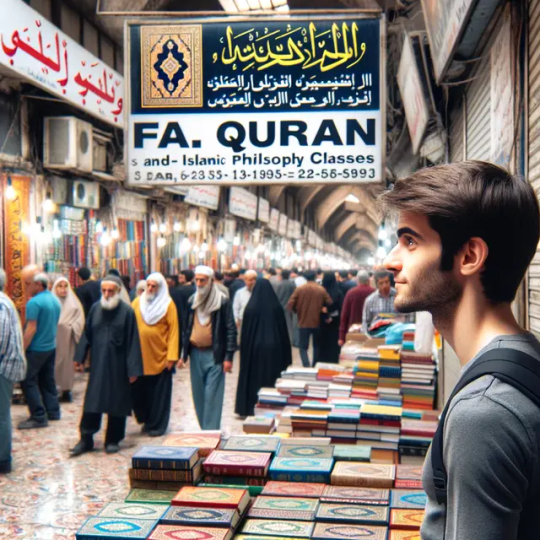
**Chapter 2: The Arab Teacher**
The class was held in a small madrasa located in a quiet alley. Upon entering, Miguel was greeted by Ahmed, an Arab teacher with an imposing presence and an air of deep wisdom. Ahmed was known throughout Córdoba not only for his vast knowledge of the Quran but also for his ability to convey the essence of Islam with patience and clarity.
Miguel, with his expression of wonder and naivety, began attending the daily lessons. At first, he didn’t understand much about the Quranic verses or the Muslim customs that Ahmed taught with such passion. But little by little, Ahmed’s enthusiasm and devotion began to awaken in Miguel a genuine interest in understanding Islam beyond its stereotypes.
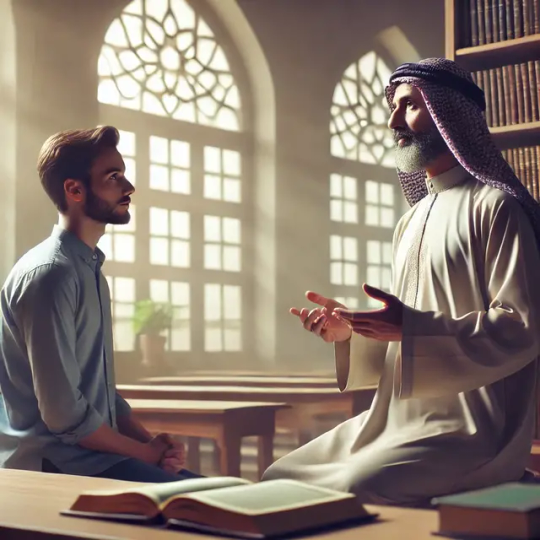
**Chapter 3: The First Steps in Islam**
Miguel was fascinated by the teachings of the Quran and the wisdom contained in its words. He marveled at how Ahmed explained the importance of inner peace, submission to Allah’s will, and brotherhood among believers. The teacher taught him about the Five Pillars of Islam: Shahada (the profession of faith), Salat (prayer), Zakat (charity), Sawm (fasting during Ramadan), and Hajj (pilgrimage to Mecca). Each lesson drew him deeper into a state of awe and respect for this new way of life.
Miguel, naive in many aspects of Muslim life, would ask questions that seemed obvious to Ahmed. But the teacher, with infinite patience, always answered, not with mockery but with a sincere desire to share his faith. Gradually, Miguel began to participate in prayers, fast during Ramadan, and learn Quranic verses in Arabic, something he never would have imagined doing before.

**Chapter 4: The Growing Fascination**
As the months passed, Miguel felt increasingly drawn to Ahmed, not just because of his wisdom but also for his charisma and deep sense of inner peace. Ahmed spoke to him about the ways of the Prophet Muhammad, explaining how Islam was not just a religion but a way of life that embraced justice, compassion, and equality. Miguel felt he had finally found something that filled the void in his heart.
Ahmed also noticed something special in Miguel. He saw not just a student eager for knowledge but someone with the potential to be a great defender of the faith. He taught Miguel to recite the Quran, interpret its meanings, and live according to the principles of Islam. Each lesson was an open door to a new world, full of meaning and purpose.
**Chapter 5: A New Path**
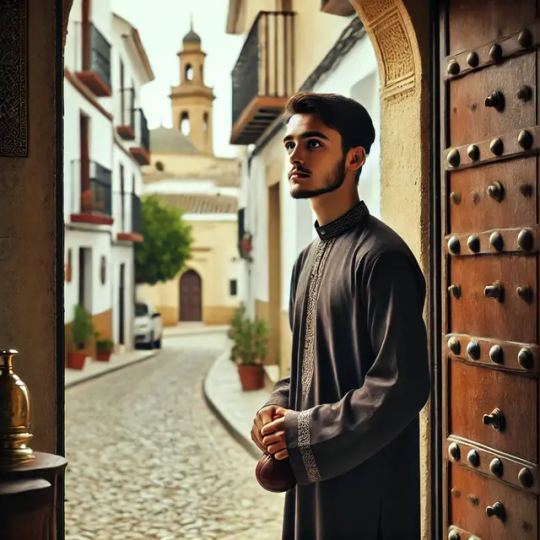
One day, after an intense study session, Miguel approached Ahmed with a decision he had been contemplating for weeks. "I want to convert to Islam," he declared with determination. "I want to follow the path of Allah and be like you, someone who lives with purpose and inner peace."
Ahmed smiled with a mix of pride and affection. He knew that Miguel was ready to take this important step. He took him to the mosque, where Miguel recited the Shahada with tears in his eyes, surrounded by his new teacher and his new brothers in faith.
**Chapter 6: Leaving Everything Behind**
Miguel, now known as Jamal, decided to leave behind his previous life, his old beliefs, and his family, who never understood his fascination with Islam. He left everything for this new life, for his new brothers, and above all, for Ahmed, who had become more than a teacher to him. Ahmed was now his mentor, his spiritual guide, and the reflection of everything Jamal wanted to be.
Every day, Jamal learned more about Muslim customs. He helped those in need, participated in philosophical debates at the madrasa, and dedicated himself to memorizing the Quran. His transformation was complete; he was no longer the naive young man who had first entered the bazaar in Córdoba but a man with a mission: to live fully in Islam.
**Epilogue: A Devoted Disciple**
Jamal's story became a legend in Córdoba, an example of how faith and devotion can transform even the most skeptical of hearts. Under Ahmed's guidance, Jamal not only found a new purpose but also became a teacher in his own right, teaching others about the beauty of Islam, always with the memory of his own transformation in his heart.
And so, Ahmed's library remained a beacon of light and wisdom in Córdoba, a place where seekers of knowledge, regardless of their origin, could find the path to true peace and understanding.
23 notes
·
View notes
Text
مناسك الحج خطوة بخطوة How to Perform Hajj مزدلفه شرح خطوات أداء مناسك الحج كيف تحج وتعتمر
#مناسك #الحج #خطوة #بخطوة #Perform #Hajj #مزدلفه #شرح #خطوات #أداء #مناسك #الحج #كيف #تحج #وتعتمر #حج, #حج2024, #مكة, #المدينة, #كعبة, #مسلم, #عمرة, #إسلام, #رحلةحج, #مبارك, #غفرانالذنوب, #اركانالحج, #نسكالحج, #طواف, #سعي, #وقوفعرفة, #مزدلفة, #منى, #رميالجمرة, #تحلقالحاج, #تقصير, #تلبية, #لبيكاللهملبيك, #الحجمبشربالجنة, #الحجاركانوواجبات, #الحجمستحبات, #الحجاتباعالهدي, #الحجاروعرحلة, #الحجمناسك,…

View On WordPress
#alhamdulillah#duas for hajj#explore hajj#get ready for hajj#hajj day#hajj dua#hajj essentials#hajj for beginners#hajj greetings#hajj mabroor#hajj moments#hajj mubarak#hajj steps#hajj vibes#hajj wardrobe#hajjaccepted#how to perform hajj#ibaadah hajj#importance of hajj#madinah#Makkah#performing hajj#places to visit in hajj#prepare for hajj#rituals#sunnah of hajj#types of hajj#what is hajj#رحلة_عمرة#عرفة_عرفات
0 notes
Text
Lalla Malika and Perfume ✨🪻💜
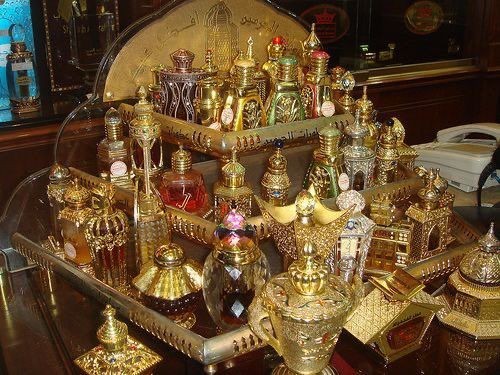
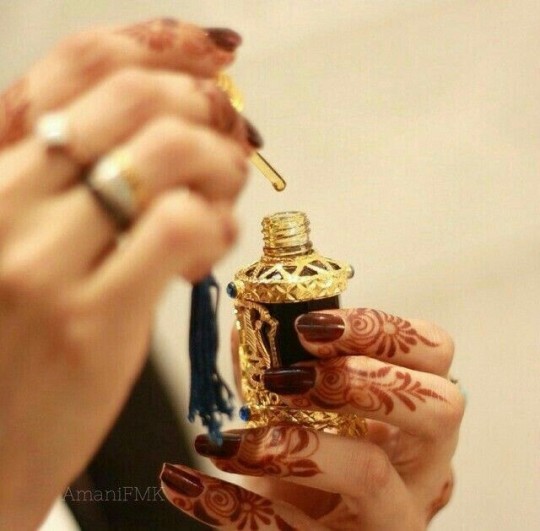
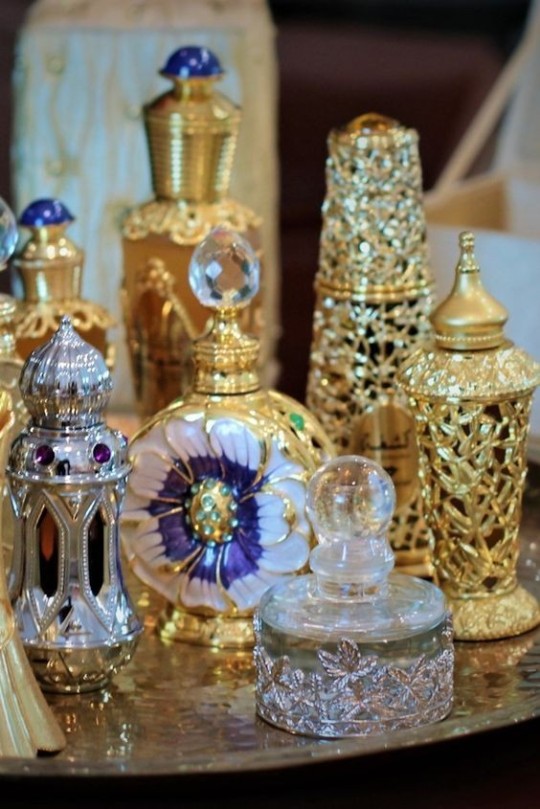
Perfume is perhaps the best known attribute of Lalla Malika, so much so that she is called "The Lady of Perfume."
But what's so important about perfume?
Well, Malika is an Arab spirit, and perfume and fragrance is important in Arab culture. And Malika in a sense is a personification of everything considered glamorous, beautiful and feminine in Moroccan culture - ornate kaftans and takchitas, detailed henna designs, gold jewellery, delicate sweets and pastries, elegant home decor, beauty products and hammam routines, and of course perfume.
In Morocco, perfume and fragrance have a high status. Incense, bakhour, candles, potpourri and musk are used to scent the home, while scented oils, creams, musk, herbs, attar and perfume is used to scent the body. Dating back to ancient times, fragrance has played a key role in beautification in Morocco. According to The Scent Trail by Celia Lyttelton, the master perfumer Serge Lutens observed of Moroccan perfumery:
As he watched the way the Moroccans perfumed everything, from their mint tea to their clothes and from their houses to their food, he had begun to think quite differently about perfume and thus about the making of scent. He told me that the Moroccans had made him an essential oil of cedarwood, which, I got the impression, made him very proud.
In Morocco they burn essences to make entire rooms perfumed, and very rich families actually eat perfume: they put a grain of musk in hot milk in the mornings and drink it, so that their whole body smells of scent from within—the body creates the perfume with just a petit grain of musk.
Not only that, but it has a connection to Islam. Good scents are associated with cleanliness, which is important in Islam, and perfume and incense plays and essential role in celebrations and gatherings in Islamic countries, ranging from Eid to weddings. The Prophet himself was known to be fond of perfumes and fragrances, and Islamic countries made significant contributions to the art of perfumery.
So Lalla Malika, who is connected to Islam, with one of her names even referring to the Hajj, and who embodies femininity, beauty, and abundance, naturally has a strong association with perfume and fragrance. One person said about her, "her spirit is like perfume."
How Much Does She Like Perfume?
I cannot stress how much she adores perfume. She's commonly described as smelling very good and leaving a pleasant scent trail behind her, and not only does she enjoy personally using perfume, but she demands her devotees wear it too, whether male or female. It's also an important part of rituals for her, and a must-have offering.
What's Her Favourite Scent?
She's mainly associated with lunar oud (oud qamari) and pure musk, which are arguably the most prized scents in Morocco, befitting of someone with such a high status. She's also been described as smelling of amber and fragrant flowers. Multiple sources say she enjoys both European and Arab colognes. Her favourite incense is described here.
What Perfumes Should I Offer?
Sources tend to emphasize that one should offer "branded" perfume, which is to say high quality perfumes from reputable brands. Perfumes from both Arab and European houses get offered, ranging from inexpensive brands like Asdaaf, Ard Al Zaafaran, and Lattafa, to more expensive brands like Versace, Dior, Mugler, Tom Ford and Gucci. They don't have to break the bank but they should be new and in good condition. It's not necessary but devotees often give perfumes in purple bottles or packaging as it's her favourite colour. Body sprays and mists are sometimes offered too.
How Is Perfume Offered?
If making a small offering, present a bottle of perfume on a tray along with some incense, some food, and a piece of jewellery. If going to a celebration, the perfume you give will be placed on one section of a table which only has perfume (and maybe beauty products) or on a tray with a selection of other perfumes which will will then be placed on the table in a ritual procession set to music.
Ritual Use of Perfume
Attendees of her taifūr will spray themselves and eachother with liberal amounts of perfume. They also sprinkle eachother with rosewater and orange blossom water, and burn incense, which is often used to scent their hair (holding it above the smoke so the smell clings).
Should I Wear Perfume?
Well, if you're a devotee, then yes, it's required. It doesn't matter if you're female or male, if you are devoted to her, you will wear perfume or cologne. Like Lalla Malika herself, her devotees are known for smelling good and leaving a scent trail wherever they go.
They have a special relationship with perfume, and it works differently on them than on most people. Perfumes that smell normal on most people smell strong on them, even after only using a small spray. Perfumes that are known not to last long will last for hours on them.
They are the kinds who always have incense burning in the house (and probably scent their clothing and hair with the smoke), who use rosewater and scented oils and creams after their hammam, and spray perfume first thing in the morning and last thing at night.
I heard that the perfume you wear needs to be changed every year even if it's still fresh but YMMV on that as it was just what one person said. The same person claims it's better if the perfume is mauve, and mauve (or purple) perfumes are commonly offered.
If you can't afford expensive cologne, it doesn't matter; she will provide for her followers. Keep her in nice offerings and she'll return them to you tenfold. Just make sure not to use counterfeit perfumes as she hates fakes. It's better to use an inexpensive but genuine perfume than a fake Chanel perfume.
Examples of perfume offerings: 1, 2, 3
11 notes
·
View notes
Text
The Importance of Madīnah al-Munawwarah
Qadī Iyad (d. 544) said:
"Among the ways to magnify and honor prophet ﷺ is to magnify all his causes and to honor his sites and places, from Makkah and Madīnah, and his institutions, and what he touched ﷺ, or is known by.

Imam Mālik رَحِمَه اللَّه would not ride an animal in Madīnah and he used to say: "I am shy before Allah to tread on the soil where the Messenger of Allāh ﷺ, is with the hoof of an animal" and it is narrated about him that he gave Imam Shafi'i many horses and mules that he had, and Imam Shafi'i said: "Keep for yourself an animal from them" So he responded to him with a similar answer.
and Imam Mālik issued a fatwa that whoever said the soil of Madīnah is bad should be beaten thirty lashes and ordered to be imprisoned, as he had a high status. He said: "How deserving he is of having his neck struck: the soil in which the Prophet ﷺ, was buried, he claims is not good!"
Az-Zāhid who was among the brave archers, that he said: "I have not touched the bow with my hand except in a state of purity since I learned that the Prophet ﷺ, took the bow with his hand."
And the cap [qālansuwa] of Khalid Ibn al-Walid had some hairs from the hair of the Prophet, His cap fell during one of his battles, and he made a fierce effort to retrieve it, which the companions of the Prophet ﷺ criticized because of the many who were killed in it. He said: "I did not do it because of the cap, but because of what it contained of his hair ﷺ so that I would not be deprived of its blessing and it would not fall into the hands of the disbelievers."
And in the Sahih, it is said that the Prophet ﷺ said about Madīnah: "Whoever commits a crime in it or shelters a criminal, upon him is the curse of Allāh, the angels, and all the people; Allāh will not accept from him any compensation or justice."
After a few lines, Qadī Iyad then said: "and it is narrated that Abū al-Fadl al-Jāwharī when he visited Madīnah and approached its houses, dismounted and walked weeping, reciting: "and when we saw the trace of the one who did not leave us a heart to recognize the traces nor a mind, We dismounted from our mounts, walking in honor of the one who departed, that we might visit him as a caravan. and it is narrated from some seekers that when he looked upon the Madīnah of the Messenger ﷺ, he began saying, quoting: "The veil has been lifted for us, revealing to the observer a moon before which illusions vanish, And when the mounts brought us to Muhammad, riding on them became forbidden, They brought us near to the best of those who trod the earth So it has upon me reverence and respect." and it is narrated from some of the mashāyikh that he performed the Hajj walking, and it was said to him about that. He said: "The runaway servant comes to the house of his master riding? If I could walk on my head, I would not walk on my feet." and it is appropriate for places that were populated by revelation and the descent of divine messages, and where Jibrīl and Mīkā'īl frequented, and from where the angels and Rūh ascended, and whose courtyards were filled with sanctification and praise, and whose soil encompassed the body of the master of mankind.
From it spread the religion [dīn] of Allāh and the Sunnah of His Messenger, what spread. Schools of verses, mosques of prayers, scenes of virtues and goodness, institutes of proofs and miracles, rites of religion [dīn], landmarks of Muslims,the stands of the master of messengers, and the abode of the seal of prophets, where prophethood burst forth, and where its tide overflowed, and places that wrapped the message, and the first land whose soil touched the skin of the chosen one. That we should honor its courtyards and inhale its fragrances."
– Kītab ash-Shifā' bi-Ta'rīf Huqūq al-Muṣṭafá 17/17
#islam#hadith#quran#islamic knowledge#muslim#muslimah#islamic#islamic lecture#islampost#holy quran#quran ayah#duaa
24 notes
·
View notes
Text
The October 7 attack and its aftermath have finally brought the disparate elements of this struggle against Jews to the surface, its participants surging into the streets and onto social media—suggesting that Hamas knew something important about the world that many of us didn’t see, or didn’t want to.
When I was a reporter for an international news agency at the time of the Hamas takeover in Gaza in 2007, I discovered that it was impolitic to mention what Hamas clearly announced in its founding charter from 1988: Namely, that “our struggle against the Jews is very great and very serious,” and the Jews were “behind the French Revolution, the Communist revolution and most of the revolutions we heard and hear about, here and there. With their money they formed secret societies, such as Freemasons, Rotary Clubs, the Lions, and others in different parts of the world for the purpose of sabotaging societies and achieving Zionist interests.”
This didn’t sound like “Free Palestine.” But as a rule, on the rare occasions that Western news organizations felt compelled to mention the document, they left those parts out.
The historical examples from the charter suggest that in the war against Judaism, the ideologues of Hamas understand themselves to be operating in a broad coalition and carrying on a long tradition. This is true. “Islam and National Socialism are close to each other in the struggle against Judaism,” Hajj Amin al-Husseini, the mufti of Jerusalem and one of the fathers of the Palestinian national movement, said in 1944. This was in a speech to members of an SS division he helped raise, made up of Bosnian Muslims. “Nearly a third of the Qur’an deals with the Jews. It has demanded that all Muslims watch the Jews and fight them wherever they find them,” he said, an idea that would reappear four decades later in the Hamas charter. When the mufti testified before a British commission of inquiry in 1936, he quoted The Protocols of the Elders of Zion, the Tsarist forgery describing a global Jewish conspiracy, which is also the source for parts of the Hamas charter and remains popular across the Middle East. (I once found the book for sale at a good shop near the American University of Beirut.) The Hamas army, known as the Izz ad-Din al-Qassam Brigades, is named for one of the mufti’s most famous proteges.
The movement became savvy enough to water down its charter a few years ago, but its leaders have remained honest about their intent. “You have Jews everywhere,” one former Hamas minister, Fathi Hammad, shouted to a crowd in 2019, “and we must attack every Jew on the globe by way of slaughter and killing, with God’s will.”
In the liberal West, no sane person would own up to believing The Protocols. (At least not yet; things are moving fast.) But an Italian can hold a prominent U.N. job, for example, after saying she believes a “Jewish lobby” controls America, and you can hold a tenured position at the best universities in the West if you believe that the only country on earth that must be eliminated is the Jewish one.
My experience in the Western press corps was that sympathy for Hamas was not just real but often more substantial than sympathy for Jews. In Europe and North America, as we’ve now seen on the streets and on campuses, many on the progressive left have arrived at an ideology positing that one of the world’s most pressing problems is the State of Israel—a country that has come to be seen as the embodiment of the evils of the racist, capitalist West, if not as the world’s only “apartheid” state, that being a modern synonym for evil.
Jews could no longer officially be hated because of their ethnicity or religion, but can legitimately be hated as supporters of “apartheid” and as the embodiment of “privilege.” The pretense that this is a critique of Israel’s military tactics, or sincere desire for a two-state solution, has now largely been dropped.
88 notes
·
View notes
Text
More notes from Stephen Shoemaker's Creating the Quran: A Historical-Critical Study:
Virtually complete silence from any source on Mecca and Yathrib (Medina) in the early 7th century; these settlements were probably not significant to the wider world at the time.
The prominence of the idea of Mecca as an important center of the spice trade in historical Islamic studies is due mostly to Henri Lammens and Mongtomery Watt, early historians of Islam, which are basically just summaries of (much later) Islamic hagiography.
In Meccan Trade and the Rise of Islam, Patricia Crone debunks the myth of Mecca as a wealthy hub of the international spice trade; other scholars have attempted to argue Mecca was indeed wealthy and important based on other economic activity, like mining precious metals, but there isn't evidence for this either, really.
There certainly isn't evidence of the kind of literacy rates we would expect to see in a place carrying out complex financial transactions. Its economy was largely pastoralist (the landscape could support little else), with only a small local trade network, and its population was small--perhaps around 500, with 130 free adult men.
Pre-Islamic Mecca as an important place of pilgrimage is also not substantiated. The most important elements of the hajj are at sites located well outside the ancient city, and discussions of ancient pilgrimages have Mecca itself as an afterthought. Mecca as a component of these pilgrimages seems to be a later development that was part of the Islamicization of these practices. The Ka'ba itself is unfortunately not only off limits to investigation, but was destroyed and rebuilt twice near the end of the 7th century, and is the product of competing interests in the second Islamic civil war.
Whether the shrine of Mecca (if it existed) was pagan or not is unknown. It is nevertheless unlikely to have been of significance to anyone outside Mecca itself. The "masjid al-haram" of the Quran is hard to identify clearly; tradition associates it with the space around the Ka'ba, but Mecca as a haram, a sacred space, is unlikely, and this term may have been associated with the nearby sites of Mina or Arafat, or somewhere else.
"Nor can we even say with any certainty that the Kaʿba and the House of the Qur’an refer to a shrine in Mecca. After all, the Qur’an explicitly identifies the location of the House as “Bakka” rather than Mecca (3:96). Judging on the basis of the Qur’an itself, and not the later Islamic tradition, Bakka clearly seems to be a different place from Mecca. The Islamic tradition is of course desperate to identify this Bakka and its sanctuary with the Meccan shrine still revered by Muslims today. Therefore, in order to remedy the Qur’an’s highly inconvenient location of its shrine in Bakka, many later Islamic scholars simply decided, without any actual historical basis, that either Bakka is an older name for Mecca or else Bakka refers specifically to the Kaʿba itself and its immediate surrounding in Mecca. There is, however, no justification for identifying Bakka with Mecca either in whole or in part other than a determined need to bring the Qur’an fully into agreement with the Islamic tradition.60 Nothing allows us to assume that when the Qur’an says Bakka it means Mecca, particularly since it correctly names Mecca elsewhere." This may in fact be an intertextual reference to Psalg 84:6-7, which places Jerusalem's Holy House in a place named Baka, said to be where pilgrims gathered to make their ascent to the Temple Mount. Early Islam was certainly interested in Jerusalem; early Muslims are said to have prayed in the direction of Jerusalem, and were interested in restoring worship and dignity to the temple there.
Yathrib was likewise small; a collection of settlements around an oasis, where dates and possibly some limited amounts of grain could be grown. It would have been bigger than Mecca, but not dramatically so--maybe a thousand inhabitants in twenty square miles, and the scale of its economy would still have been very small, with very limited trade--the real trade routes of the era were on the Red Sea by ship, not inland through places like Yathrib.
The Quran itself "clearly demands" an audience well-versed in Biblical and post-Biblical traditions; it presupposes familiarity with tropes of that tradition, and opaquely references things it assumes its audience knows well. It is unlikely that the background culture of Muhammad's day in Mecca or the Yathrib oasis was familiar with this literature, and "it seems far more reasonable" to assume extensive contact between Muhammad's early followers and these traditions took place outside the central inland Hijaz. This is in facy why Cook, Crone, et al. locate the beginnings of Islam further north (but this maybe mistakes a later process of cultural contact that was read back into Islam's beginnings as being there from the start. Mecca and Medina were important political centers of Islam from very early on, so if Islam didn't arise there, it would be weird for these small towns to suddenly become important later).
62 notes
·
View notes
Text
The First Ten Days Of Dhu al-Hijjah
The first ten days of Dhu al-Hijjah are considered the most sacred and blessed days in the Islamic calendar.
Muslims are encouraged to increase their worship, prayer, and acts of charity during this period.
Fasting on the 9th day of Dhu al-Hijjah, known as the Day of Arafah, is highly recommended for those not performing Hajj.
The Prophet Muhammad (peace be upon him) emphasized the importance of these days, stating that “there are no days in which righteous deeds are more beloved to Allah than these ten days.” [Jami` at-Tirmidhi 757]
Eid al-Adha, also known as the Festival of Sacrifice, falls on the 10th day of Dhu al-Hijjah and commemorates the willingness of Prophet Ibrahim to sacrifice his son as an act of obedience to God. . . . #hajj#dhulhijjah#dayofarafah#makkah#masjidalharam#allahﷻ#sacrifice#clocktower#dua#blessed#days#arafah#islamic#IslamicReminders#islamicposts#muslimummah#DoGoodDeeds#fast#deeds#deen#makkah#madinah#islam#dhulhijjah2024#islam#Muslims#Ummah#eiduladha#kaaba#ramadan#eidmubarak
23 notes
·
View notes